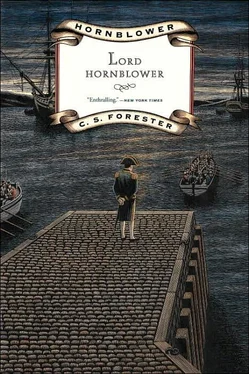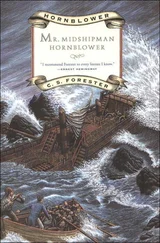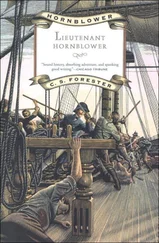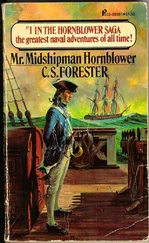Cecil Forester - Lord Hornblower
Здесь есть возможность читать онлайн «Cecil Forester - Lord Hornblower» весь текст электронной книги совершенно бесплатно (целиком полную версию без сокращений). В некоторых случаях можно слушать аудио, скачать через торрент в формате fb2 и присутствует краткое содержание. Год выпуска: 1989, ISBN: 1989, Издательство: Little, Brown & Company, Жанр: Исторические приключения, Путешествия и география, Морские приключения, на английском языке. Описание произведения, (предисловие) а так же отзывы посетителей доступны на портале библиотеки ЛибКат.
- Название:Lord Hornblower
- Автор:
- Издательство:Little, Brown & Company
- Жанр:
- Год:1989
- ISBN:0316289434
- Рейтинг книги:5 / 5. Голосов: 1
-
Избранное:Добавить в избранное
- Отзывы:
-
Ваша оценка:
- 100
- 1
- 2
- 3
- 4
- 5
Lord Hornblower: краткое содержание, описание и аннотация
Предлагаем к чтению аннотацию, описание, краткое содержание или предисловие (зависит от того, что написал сам автор книги «Lord Hornblower»). Если вы не нашли необходимую информацию о книге — напишите в комментариях, мы постараемся отыскать её.
Lord Hornblower — читать онлайн бесплатно полную книгу (весь текст) целиком
Ниже представлен текст книги, разбитый по страницам. Система сохранения места последней прочитанной страницы, позволяет с удобством читать онлайн бесплатно книгу «Lord Hornblower», без необходимости каждый раз заново искать на чём Вы остановились. Поставьте закладку, и сможете в любой момент перейти на страницу, на которой закончили чтение.
Интервал:
Закладка:
“Heave-to! Get the foretops’l in! Set the maint’mast stays’l. Quartermaster, bring her to.”
“Bring her to, sir.”
The furling of the foretopsail eased her, and the staysail steadied her, and then she came to the wind. Until now she had fought against it; now she yielded to it, like a woman giving way at last to an importunate lover. She rose to an even keel, turning her starboard bow to the choppy seas, rising and falling to them with something of rhythm instead of her previous unpredictable plunges over the quartering waves. The starboard mainshrouds gave something of a lee to Hornblower where he stood against the starboard bulwark, so that even the force of the wind seemed to be a little moderated.
Chapter IV
Everything was much more comfortable, no doubt, much safer. There was no danger now of the Porta Coeli losing spars or canvas or working her seams considerably open. But it did not bring her any nearer to the Flame and her mutinous crew; on the contrary, it meant that every moment she was drifting farther away, and to leeward. To leeward! Hornblower’s mind, like that of every sailor, was obsessed with the importance of keeping to windward of one’s destination. He grudged bitterly every yard of leeway made, far more bitterly than any miser grudged paying out his pieces of gold. Here in the Channel in the late autumn, where westerly gales were to be expected daily, any drift to the eastward might have to be bought back at compound interest. Every hour of leeway would have to be regained when the wind moderated, by two or three hours of beating back to windward, unless the wind should come easterly, which one could not expect.
And every hour might count; no one could guess what might be the next mad action of the desperate men on board Flame. At any moment they might be led by panic to hand themselves over to the French; or the ringleaders might abandon the vessel and seek refuge in France, never to be regained for the hangman’s rope. And at any moment the news might begin to seep through the Navy that a king’s ship had successfully thrown off the bonds of discipline, that downtrodden seamen were negotiating, as one power with another, with the Lords of the Admiralty. Hornblower could guess only too well what might be the effect of that news. The sooner Flame was dealt with in exemplary fashion the better; but he was still without any idea as to how to deal with her. This present gale would hardly discommode her—she would be able to ride it out in the lee of the Normandy peninsula. A vessel of her tonnage could venture anywhere in the Bay of the Seine; on the one hand she could run for Le Havre, on the other to Caen river.
The batteries of the Cotentin coast would protect her; the chasse-marées and the Seine gunboats would be ready to come to her aid. Both at Cherbourg and at Le Havre there were French frigates and ships of the line, half manned and unready for sea, but always able at a pinch to push out a few miles from port and cover the escape of the Flame. At the approach of superior force she would certainly run; she might stand and fight an equal, such as this Porta Coeli, but Hornblower found himself hesitating at the prospect of meeting on equal terms a British ship manned by English sailors filled with the courage of despair. Victory would be dearly bought—what a triumphant clamour Bonaparte would raise through Europe at the news of a battle between two British ships! There would be many dead—what would be the effect on the Navy at the news of British sailors killing each other? What would be the results in Parliament? And the chances were certainly large that the two brigs would cripple each other so badly as to fall easy victims to the chasse-marées and gunboats. And worse than that, there was the chance of defeat. Equal ships, equal crews; a chance as arbitrary as the spin of a coin might decide the action. No, only as a last resort, perhaps not even then, would he fight a simple action against the Flame. But what the devil was he to do ?
Hornblower shook himself into consciousness of the world about him, backing out of the blind alley of thought in which he had found himself. The wind was still shrieking round him, but it was no longer an avalanche of darkness. Before his eyes the lean rectangle of the reefed maintopsail was distinctly visible against the sky. There was a faint grey light about him; the white-flecked waves over which the brig was uneasily rising were plain to his sight. Morning was coming. Here he lay, hove-to in mid-Channel, out of sight of land. And it was still less than twenty-four hours since he had sat in silks amid the Knights of the Bath in Westminster Abbey, and much less than twenty-four hours since Barbara had—that was another line of thought from which he had hastily to shake himself free. It was raining again, the chill drops blowing into his face. He was cold through and through; as he moved he felt Barbara’s scarf about his neck sopping wet with the water that had run down from his face. Freeman was beside him; the day-old beard that sprouted on Freeman’s cheeks was an additional convincing touch in his gipsy appearance.
“The glass stays low, sir,” said Freeman. “No sign of the weather moderating.”
“I can see none myself,” said Hornblower.
There was scanty material for conversation, even if Hornblower had wanted to enter into conversation with his subordinate. The grey sky and the grey sea, the shrieking wind, the chill that enveloped them, the pessimistic gloom which clouded Hornblower’s thoughts, all these helped Hornblower to maintain the deliberate taciturnity which he had so long cultivated.
“Have me called at the first sign of a change, Mr. Freeman,” he said.
He walked over to the hatchway; it was only with an effort that he could set one foot before the other, and he could hardly bend at all to get his hands on the hatch coaming as he descended. His joints groaned as he crept under the threatening deck-beams into his cabin. He was utterly numb with cold and fatigue and sea-sickness. He was just conscious, resentfully, that he must not fall, as he longed to do, fully clothed upon his cot—not for fear of rheumatism, but because there might be no chance for days of drying the cot’s bedding if once he made it wet. And then here came Brown, materialising suddenly at his side—he must have been alert in the wardroom pantry on the watch for him.
“Let me take your coat, sir,” said Brown. “You’re cold, sir. I’ll untie that scarf. Those buttons, sir. Sit down now and I’ll be able to get those boots off, sir.”
Brown was stripping him of his wet clothes as if he were a baby. He produced a towel as if by magic, and chafed Hornblower’s ribs with it; Hornblower felt life returning through his veins at the touch of the coarse material. Brown slipped a flannel nightshirt over his head, and then knelt on the swaying deck to chafe his legs and feet. Through Hornblower’s dazed mind there passed a momentary amazement at Brown’s efficiency. Brown was good at everything to which he turned his hand; he could knot and splice, and he could drive a pair of horses; he could carve model ships for Richard, and be tutor and nursemaid to the boy as well; heave the lead, hand and reef, and wait at table; take a trick at the wheel or carve a goose; undress a weary man and—just as important—know when to cut off his flow of soothing remarks and lay him down in silence and pull the blankets over him, leaving him alone without any trite or irritating words about hoping he slept well. In Hornblower’s last tumultuous thoughts before exhaustion plunged him into sleep he decided that Brown was a far more useful member of society than he himself was; that if in his boyhood Brown had been taught his letters and his figures, and if chance had brought him to the quarter-deck as a king’s letter-boy instead of to the lower deck as a pressed man, he would probably be a captain by now. And, significantly, hardly a trace of envy tinged Hornblower’s thoughts of Brown; he was mellow enough by now to admire without resentment. Brown would make some woman a fine husband, as long as there was no other woman within reach. Hornblower smiled at that, and went on smiling in his sleep, sea-sickness and the plunging of the Porta Coeli over the short seas notwithstanding.
Читать дальшеИнтервал:
Закладка:
Похожие книги на «Lord Hornblower»
Представляем Вашему вниманию похожие книги на «Lord Hornblower» списком для выбора. Мы отобрали схожую по названию и смыслу литературу в надежде предоставить читателям больше вариантов отыскать новые, интересные, ещё непрочитанные произведения.
Обсуждение, отзывы о книге «Lord Hornblower» и просто собственные мнения читателей. Оставьте ваши комментарии, напишите, что Вы думаете о произведении, его смысле или главных героях. Укажите что конкретно понравилось, а что нет, и почему Вы так считаете.









